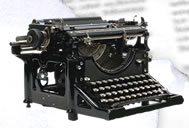In our day, the significance of the 1945 Battle of Iwo Jima is often dismissed as a campaign that should never have been waged; be that as it may, the following attachment is the U.S. Government explanation as to why the invasion of Iwo Jima was an essential part of the American strategy to invade Japan. Although you won't find the information in this particular YANK article, the Marine and Army units that were to play leading rolls in the Japanese invasion were already selected and were at this point in training for the grim task before them (had it not been for the deployment of the Atomic Bombs, which hastened an end to the hostilities and saved hundreds of thousands of lives on both sides).
Yank staff correspondent Bill Reed wrote the following account of the Fifth Marine Division's slug fest on the island of Iwo Jima throughout the months on February and March, 1945:
"For two days the men who landed on Green beach were pinned to the ground. Murderous machine-gun, sniper, and mortar fire came from a line of pillboxes 300 yards away in the scrubby shrubbery at the foot of the volcano. No one on the beach, whether he was a CP phone operator or a front line rifleman, was exempt. The sight of a head raised above a foxhole was the signal to dozens of Japs, safely hidden in the concrete emplacements, to open up. Men lay on their sides to drink from canteens or urinate. An errand between foxholes became a life-and-death mission for the man who attempted it."
Written by war correspondent Walter Davenport some thirteen months prior to taking the helm as editor-in-chief at
Collier's Magazine, this article gives the reader a sense as to what D-plus-one looked like from the fifty yard line at the Battle of Iwo Jima (Operation Detachment: February 19 – March 26, 1945):
"There is no Jap navy here to stop us; no Jap air force, either... So you see Jap? On our way up here to Iwo we flew over more supply ships, more cargo carriers. Those decks carry concrete mixers, Diesel-powered road crushers and rollers. There aren't many cliffs on Iwo to hide out in, Jap! You can't live for weeks in the crevices of Suribachi. You can't grow gardens on that rock. So, while you can still see, look down at what we're seeing: An American city, a harsh, womanless city is moving in on you."
Davenport's observations were no doubt a comfort to the Collier's readers on the home front, but post-war accounting revealed that one quarter of the U.S. Navy's losses took place at Iwo Jima and Okinawa.
Click here to read a unique story about the Battle of the Sula Straits...
"Some Jap officers, unable to face the prospect of defeat, dressed in their best uniforms, laid their samurai swords by their sides and then shot themselves in the head. Tokyo broadcast a plaintive admission from the Jap commander on Iwo Jima, General Tadamichi Kuribayashi:"
'This island is the front line that defends our mainland and I am going to die here.'
"He was right on both counts."
"One of the most familiar human sounds in any Central Pacific operation is a rasping, oath-throwing voice with a rich Scandinavian accent which booms out over the loudspeaker on the invasion beaches. The voice threatens, gives orders with no reservations, pleads and intimidates. It is the voice of a Navy captain, Carl E. (
Squeaky) Anderson, the force, or senior, beachmaster - the man who unloads the ships and keeps the supplies (all 64,000 tons) rolling in."
"Iwo Jima, he says, is the worst beach he's ever had anything to do with."
"The first Marine waves that stormed ashore on Iwo Jima included a stalwart young sergeant who stood out as a leader even in that picked group. Handsome, dark-haired, and purposeful, he strode through the surf seemingly oblivious to the enemy's artillery fire. His eyes focused inland on a spot suitable for his machine-gun platoon... Suddenly, a Jap shell screamed. The sergeant fell. John Basilone, first enlisted Marine in this war to win the Congressional Medal of Honor, was dead."
"Nine months and a day after she was commissioned, the pug-nosed little carrier
Bismark Sea (CVE-95) was as much in the two-day-old battle for Iwo Jima as the Marines fighting for the island's lower air strip. This was her third major campaign in less than four months. Her career was just beginning, and the crew was proud of calling her the
Busy Bee. She was a happy ship."
Happy or not, after two Kamikazes hit home, the ship sank in just two hours, taking 318 men with her. She claimed the dubious distinction of being the last American carrier to be lost in the war.
